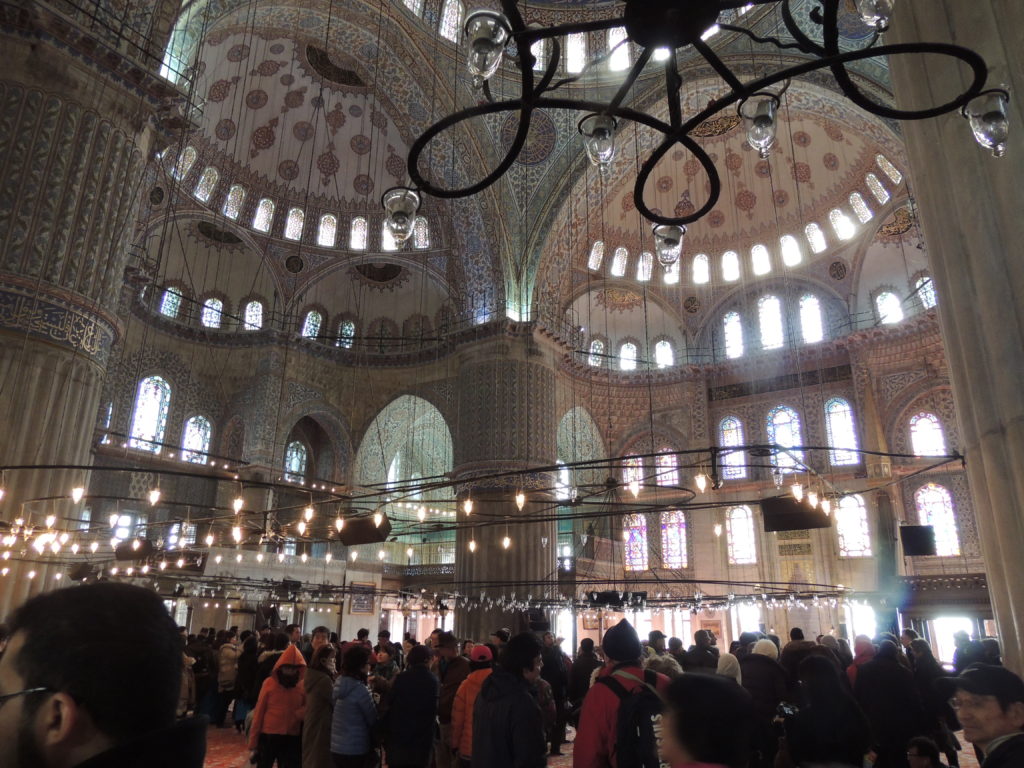The Daily Escape:

Blue Mosque, Istanbul -2013 photo by Wrongo
Wrongo planned on taking the rest of the week off, but couldn’t resist this:
We live in a time when inequality of wealth, income and influence is thought to be greater than at any time in history. Inequality strengthens social injustice and with it the existence of The Privileged and The Disadvantaged. Of those who have influence and feel they are entitled to everything, and those who expect little, receive even less but need most. Government policies are fashioned by The Privileged for their own benefit. The Disadvantaged, having little or no voice, are ignored, allowing the Cycle of Containment to be maintained, change to be suppressed and social divisions to deepen.
This is from a post entitled What Price Humanity? at Dissident Voice, and it is a pretty accurate description of where we are in America. More:
Sitting at the center of this socio-economic tragedy is an economic ideology that is not simply unjust, it is inhumane. Compassion and human empathy are pushed into the shadows in the Neo-Liberal paradigm, selfishness, division and exploitation encouraged. The system promotes short-term materialistic values and works against mankind’s natural inclination towards unity, social responsibility and cooperation, inherent qualities that are consistently made manifest in times of crisis, individual hardship and collective need.
Graham Peebles is asking what are We the People entitled to in 2017 America? And his answer is grim.
Wrongo thinks nothing is more appropriate to this discussion than FDR’s Second Bill of Rights as stated January 11, 1944 in his message to the US Congress on the State of the Union:
- The right to a useful and remunerative job in the industries or shops or farms or mines of the nation;
- The right to earn enough to provide adequate food and clothing and recreation;
- The right of every farmer to raise and sell his products at a return which will give him and his family a decent living;
- The right of every businessman, large and small, to trade in an atmosphere of freedom from unfair competition and domination by monopolies at home or abroad;
- The right of every family to a decent home;
- The right to adequate medical care and the opportunity to achieve and enjoy good health;
- The right to adequate protection from the economic fears of old age, sickness, accident, and unemployment;
- The right to a good education.
FDR could foresee the end of WWII when he gave this speech. He concluded that: (emphasis by the Wrongologist)
All of these rights spell security. And after this war is won we must be prepared to move forward, in the implementation of these rights, to new goals of human happiness and well-being.
Sadly, on this 2017 Thanksgiving weekend, we remain very far from these goals.
The inequality and sense of entitlement we see today won’t be turned around without work. Financialization is a poisonous monster. It dictates government policy, and makes the rules about how our businesses and governments at all levels engage with our people and our environment.
People are little more than sources of revenue: Their capacity to spend, to invest and consume determines how they are valued. Driving virtually every decision within the suffocating confines of the ideal is an addiction to profit.
FDR’s ideas seem quaint in 2017. The US cannot even ensure basic civil rights such as racial equality, much less “life, liberty, and the pursuit of happiness.” Most Americans have freely indentured themselves to the financial sector so that they can pretend to own a house in which to raise their kids, and a car to drive to work in order to earn income so they can make loan payments on the house and the pick-up.
Enough! Let’s forget about life for a while. Grab a cup of Climpson & Sons Signature Espresso that is 100% Adamo Sasaba from Ethiopia, and stay away from the turkey Tetrazzini at lunchtime.
Now, watch and listen to Narciso Yepes interpret Joaquin Rodrigo’s Concerto d’Aranjuez (Adagio) on his 10-string guitar. The 10-string was conceived in 1963 by Yepes, who ordered it from José Ramírez [III].
The conductor is Raphael Frübeck de Burgos with the Radio Symphony Orchestra of Frankfurt. It’s a lovely piece with a remarkable guitar:
Those who read the Wrongologist in email can view the video here.


